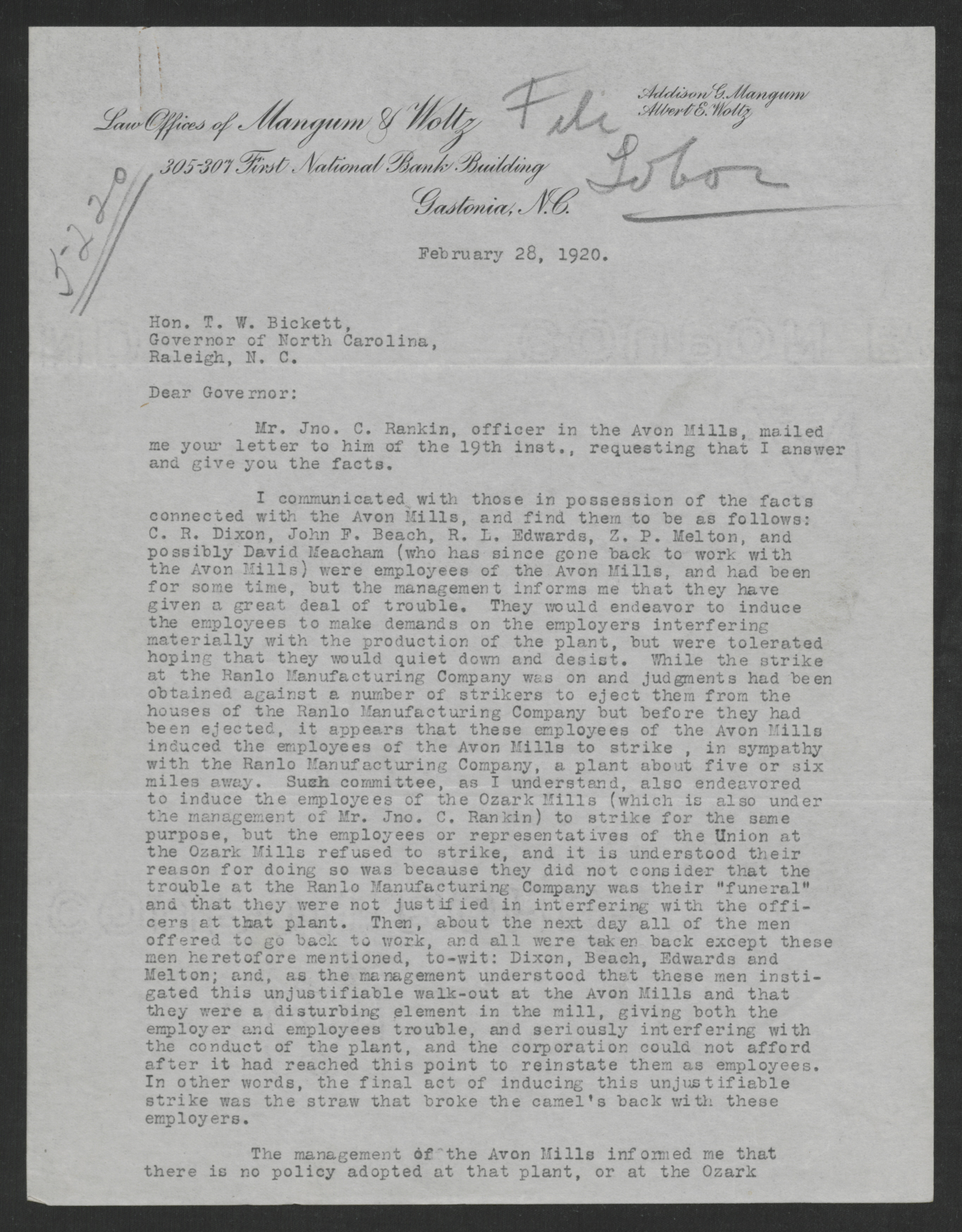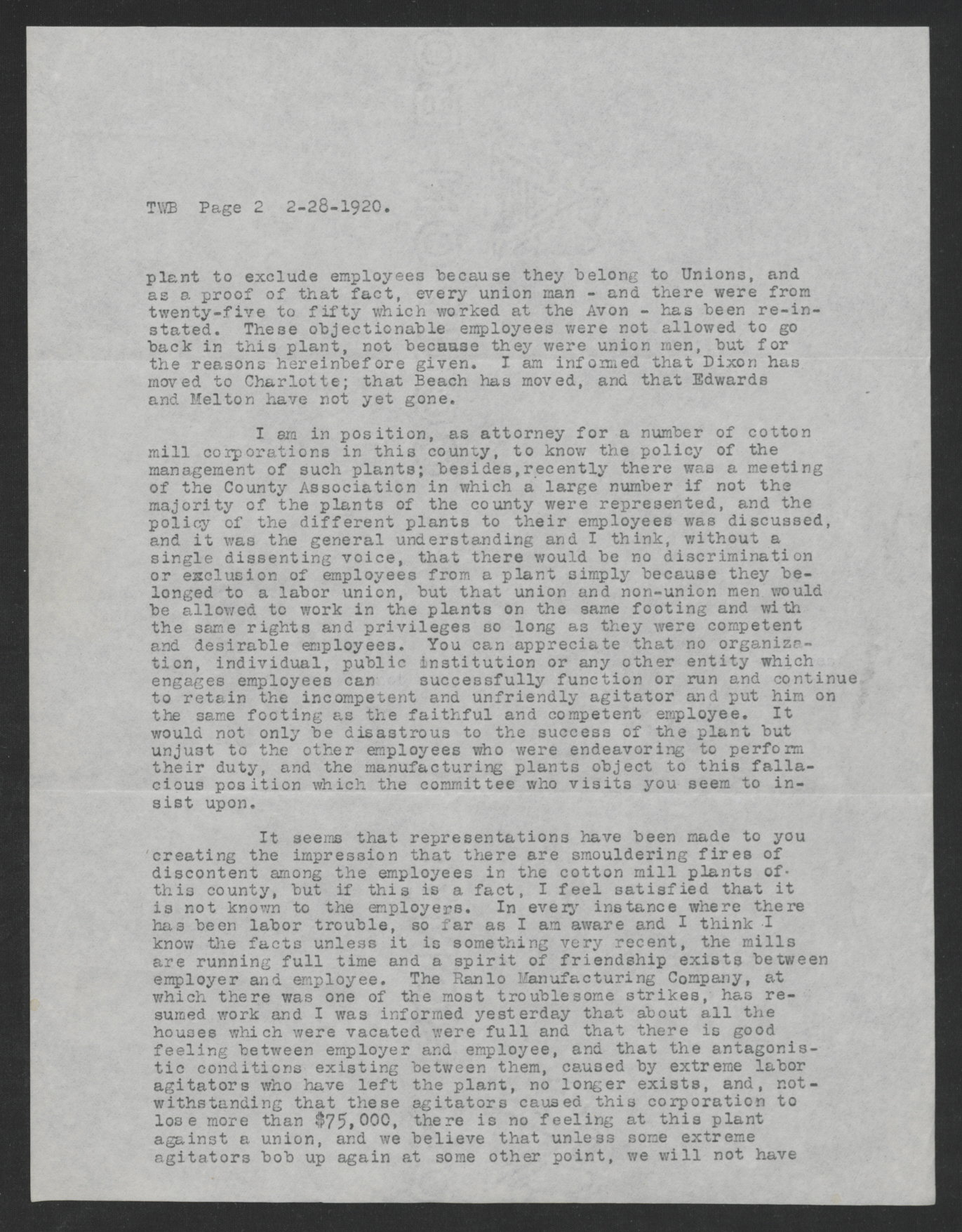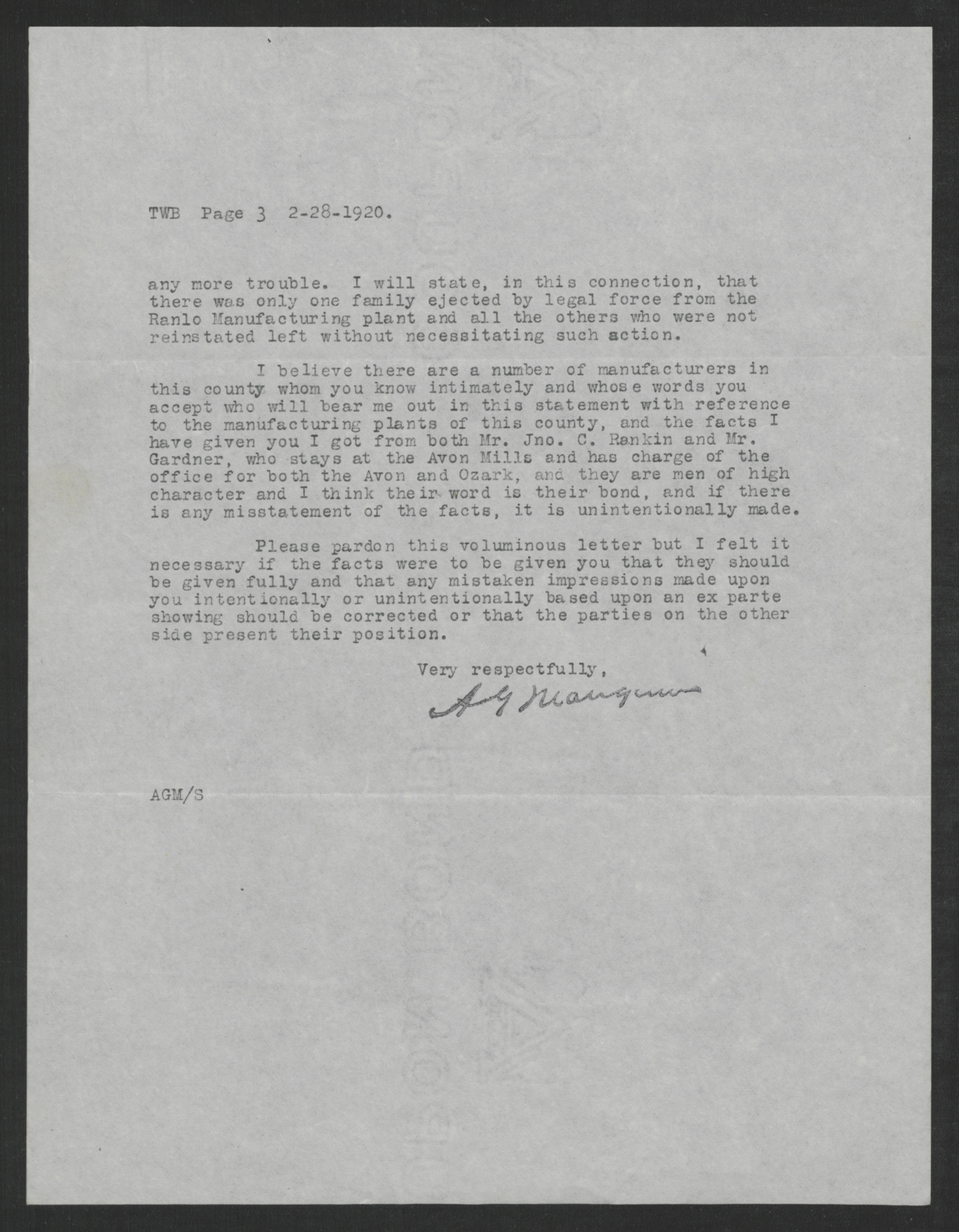Addison G. Mangum
Albert E. Woltz
Law Offices of Mangum & Woltz
305-307 First National Bank Building
Gastonia, N.C.
February 28, 1920.
Hon. T. W. Bickett,
Governor of North Carolina,
Raleigh, N.C.
Dear Governor:
Mr. Jno. C. Rankin, officer in the Avon Mills, mailed me your letter to him of the 19th inst., requesting that I answer and give you the facts.
I communicated with those in possession of the facts connected with the Avon Mills, and find them to be as follows: C. R. Dixon1, John F. Beach, R. L. Edwards, Z. P. Melton, and possibly David Meacham (who has since gone back to work with the Avon Mills) were employees of the Avon Mills, and had been for some time, but the management informs me that they have given a great deal of trouble. They would endeavor to induce the employees to make demands on the employers interfering materially with the production of the plant, but were tolerated hoping that they would quiet down and desist. While the strike at the Ranlo Manufacturing Company was on and judgments had been obtained against a number of strikers to eject them from the houses of the Ranlo Manufacturing Company but before they had been ejected, it appears that these employees of the Avon Mills induced the employees of the Avon Mills to strike, in sympathy with the Ranlo Manufacturing Company, a plant about five or six miles away. Such committee, as I understand, also endeavored to induce the employees of the Ozark Mills (which is also under the management of Mr. Jno. C. Rankin) to strike for the same purpose, but the employees or representatives of the Union at the Ozark Mills refused to strike, and it is understood their reason for doing so was because they did not consider that the trouble at the Ranlo Manufacturing Company was their "funeral" and that they were not justified in interfering with the officers at that plant. Then, about the next day all of the men offered to go back to work, and all were taken back except these men heretofore mentioned, to-wit: Dixon, Beach, Edwards and Melton; and, as the management understood that these men instigated this unjustifiable walk-out at the Avon Mills and that they were a disturbing element in the mill, giving both the employer and employees trouble, and seriously interfering with the conduct of the plant, and the corporation could not afford after it had reached this point to reinstate them as employees. In other words, the final act of inducing this unjustifiable strike was the straw that broke the camel's back with these employers.
The management of the Avon Mills informed me that there is no policy adopted at that plant, or at the Ozark plant to exclude employees because they belong to Unions, and as a proof of that fact, every union man - and there were from twenty-five to fifty which worked at the Avon - has been re-instated. These objectionable employees were not allowed to go back in this plant, not because they were union men, but for the reasons hereinbefore given. I am informed that Dixon has moved to Charlotte; that Beach has moved, and that Edwards and Melton have not yet gone.
I am in position, as attorney for a number of cotton mill corporations in this county, to know the policy of the management of such plants; besides, recently there was a meeting of the County Association in which a large number if not the majority of the plants of the county were represented, and the policy of the different plants to their employees was discussed, and it was the general understanding and I think, without a single dissenting voice, that there would be no discrimination or exclusion of employees from a plant simply because they belonged to a labor union, but that union and non-union men would be allowed to work in the plants on the same footing and with the same rights and privileges so long as they were competent and desirable employees. You can appreciate that no organization, individual, public institution or any other entity which engages employees can successfully function or run and continue to retain the incompetent and unfriendly agitator and put him on the same footing as the faithful and competent employee. It would not only be disastrous to the success of the plant but unjust to the other employees who were endeavoring to perform their duty, and the manufacturing plants object to this fallacious position which the committee who visits you see to insist upon.
It seems that representations have been made to you creating the impression that there are smouldering fires of discontent among the employees in the cotton mill plants of this county, but if this is a fact, I feel satisfied that it is not known to the employers. In every instance where there has been labor trouble, so far as I am aware and I think I know the facts unless it is something very recent, the mills are running full time and a spirit of friendship exists between employer and employee. The Ranlo Manufacturing Company, at which there was one of the most troublesome strikes, has resumed work and I was informed yesterday that about all the houses which were vacated were full and that there is good feeling between employer and employee, and that the antagonistic conditions existing between them, caused by extreme labor agitators who have left the plant, no longer exists, and, notwithstanding that these agitators caused this corporation to lose more than $75,000, there is no feeling at this plant against a union, and we believe that unless some extreme agitators bob up again at some other point, we will not have any more trouble. I will state, in this connection, that there was only one family ejected by legal force form the Ranlo Manufacturing plant and all the others who were not reinstated left without necessitating such action.
I believe there are a number of manufacturers in this county whom you know intimately and whose words you accept who will bear me out in this statement with reference to the manufacturing plants of this county, and the facts I have given you I got from both Mr. Jno. C. Rankin and Mr. Gardner, who stays at the Avon Mills and has charge of the office for both the Avon and Ozark, and they are men of high character and I think their word is their bond, and if there is any misstatement of the facts, it is unintentionally made.
Please pardon this voluminous letter but I felt it necessary if the facts were to be given you that they should be given fully and that any mistaken impressions made upon you intentionally or unintentionally based upon an ex parte showing should be corrected or that the parties on the other side present their position.
Very respectfully,
AGM/S
1. This is most likely Charles Robert Dixon, a mill laborer born in Gaston County, North Carolina.







